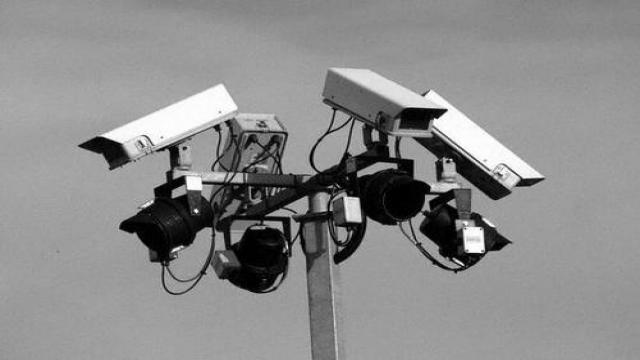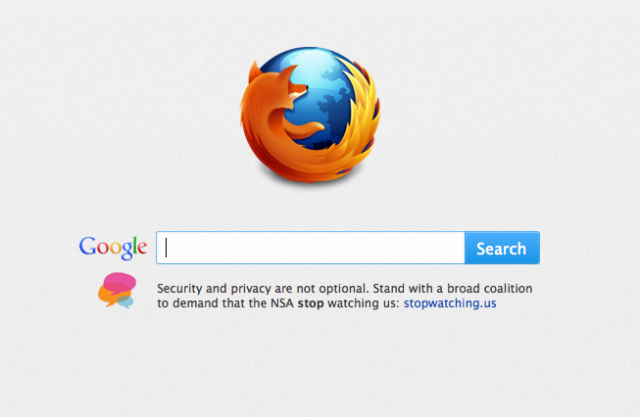
A coalition of 85 technology companies, organizations and privacy advocates — including the American Civil Liberties Union and the Electronic Frontier Foundation — launched a website Tuesday calling for a special congressional committee to investigate the National Security Agency’s secret surveillance program.
Sina Khanifar, participating advocate and founder of FixtheDMCA.org, told Mint Press News in a statement that the “Stop Watching Us” movement is intended to push the government to create an investigative Congressional body similar to the Church Committee, which was formed to investigate the Watergate scandal in the 1970s.
“As it stands, we simply don’t know the scope of the NSA’s surveillance programs,” he said. “Greater transparency is critical.”
The NSA surveillance program has come under national — and international — scrutiny after former CIA-staffer-turned-NSA-contractor Edward Snowden leaked information regarding the agency’s policies, revealing it regularly monitors communication data of users of major, U.S.-headquartered websites, as well as phone call “metadata” through a secretive partnership with Verizon.
The Washington Post and The Guardian reported the U.S. government accesses messages, video, audio, photographs and “connection logs” that provide insight into the location of information of users.
Outrage from both sides of the political aisle <<http://www.mintpressnews.com/a-pandoras-box-opened-politicians-analysts-alike-unnerved-by-nsa-surveillance/>> is anchored in questions over the constitutionality of the spying program, as it may present grave violations of the Fourth Amendment’s protection against unreasonable search and seizure.
The Stop Watching Us website serves as a platform for Americans to petition the government to investigate the “full extent of the NSA’s spying programs.”
A letter to Congress, used as part of the petition and published on the site, lays out the group’s concerns, along with demands that Congress reform Section 215 of the Patriot Act to “make clear that blanket surveillance of the Internet activity and phone records of any person residing in the U.S. is prohibited by law and that violations can be reviewed in adversarial proceedings before a public court.”
It also demands Congress reform the FISA Amendments Act, which allows for mass communications surveillance, and to hold public officials accountable for the NSA spying program.
The Stop Watching Us movement is being backed by Internet browser Mozilla, which is linking the website to its browser’s start page for easy access.
“They’ve been instrumental in pulling this together, and I’m personally very excited about having millions of eyeballs directed at this message,” Khanifar said.
<<>> In related news, as reported by Dan Roberts and Spencer Ackerman in The Guardian <<< http://www.guardian.co.uk/world/2013/jun/10/patriot-act-nsa-surveillance..., U.S. lawmakers already called Monday for their own review of the Patriot Act:
The White House has said it would consider congressional calls to review the Patriot Act after conceding that revelations over the scale of US surveillance activity had sparked "an appropriate debate".
The legislation, which was introduced after the 9/11 attacks, has been cited as the legal basis for the National Security Agency scouring billions of ordinary US telephone records in an effort to combat terrorism.
But even one it authors, Republican Jim Sensenbrenner, has questioned whether the act has been misapplied in the cases revealed to the Guardian by former CIA whistleblower Edward Snowden.
The administration insisted Monday it welcomed the intense furore in Washington that has followed Snowden's disclosures. "If that debate were to lead to building a consensus around changes [to the Patriot Act], he would look at that," said spokesman Jay Carney. "The president has been very clear that he takes the concerns about these issues very seriously."
Hints of Obama's willingness to consider changing tack came as the Republican leadership in Congress also increasingly turned against the intelligence community on the issue.
On Monday Paul Ryan, the former vice-presidential nominee, joined three other likely Republican candidates for 2016 in raising questions about whether privacy was being unduly threatened.
"I'm sure somebody can come up with a great computer program that says: 'We can do X, Y, and Z,' but that doesn't mean that it's right," he told a radio station in Wisconsin.
"I want to learn a lot more about it on behalf of the people I represent," he added.
Pressure is growing on the White House to explain whether there was effective congressional oversight of the programs revealed by Snowden.
In unbroadcast elements of a transcript issued by NBC, the director of National Intelligence, James Clapper, said he had responded in the "least untruthful manner" possible when denying that the NSA collected data on millions of Americans during congressional hearings.
Clapper also confirmed that senator Dianne Feinstein, chair of the intelligence committee, had asked for a review to "refine these NSA processes and limit the exposure to Americans' private communications" and report back "in about a month".
Senior Republicans tave also spoken out against the "unprecedented and intrusive surveillance" revealed by Snowden, joining a growing alliance of politicians from left and right voicing concern.
Though none have yet defended the leak itself, they stand in stark contrast to congressional leaders on the House and Senate intelligence committees who authorised the programs and have criticised Snowden as a "defector" who threatens national security.
The increasingly angry reaction in Congress to revelations of the sweeping surveillance programmes are opening a new fault line in American politics that may determine Washington's response to the whistleblower.
The White House has yet to say whether it would be seeking his extradition, but it issued a statement on Sunday night confirming the Department of Justice had launched a criminal investigation. "Any person who has a security clearance knows that he or she has an obligation to protect classified information and abide by the law," said a spokesman for Clapper.
But President Obama will have to weigh mounting political sympathy when deciding how aggressively to respond to the leaks, particularly if the issue becomes a rallying point for Republicans seeking to portray an over-powerful state.
On Friday night, Texas governor Rick Perry, who ran for the 2012 Republican presidential nomination, attacked Obama for a "fundamental misuse of the massive power of the federal government".
"We have an administration today that is taking alarming steps to infringe upon our rights in the name of consolidating their power," he told a group of grassroots activists in San Antonio.
"Who knew, when you were watching the Verizon ad and the guy said: 'Can you hear me now?,' that was really just a mike check for the Obama administration," joked Perry, who drew a standing ovation. "These acts are something I would expect to see out of China but not out of the United States."
Up-and-coming Tea Party favourite Ted Cruz issued a similar statementon Friday after the wave of disclosures, saying he would work with "colleagues in the Senate who share my concerns to ensure that we have all the facts about these surveillance programs".
"They are implementing what appears to be an unprecedented and intrusive surveillance system on private American citizens... in light of this Administration's track record, how can they expect to be trusted?" he said.
"We have discovered over the past few months an ongoing pattern of wanton disregard not only for Americans' privacy, but for the truth – DOJ's refusal to be forthcoming about drone policy, IRS's targeting groups for their political beliefs and then misleading the American people about it, DOJ's targeting of journalists for doing their jobs, and now what seems an unprecedented intrusion into Americans' personal phone records and potentially into their broader online activities."
The linking of NSA surveillance with other recent scandals such as the Internal Revenue Service targeting Republican groups threatens to dominate Obama's second term and may serve to balance calls within the intelligence community to pursue Snowden and robustly defend existing practices.
Most forceful of all was senator Rand Paul, who has a track record as a libertarian and now hopes to challenge NSA surveillance in the supreme court.
"If the seizure and surveillance of Americans' phone records – across the board and with little to no discrimination – is now considered a legitimate security precaution, there is literally no protection of any kind guaranteed anymore to American citizens," he said in an opinion piece for the Guardian. "In their actions, more outrageous and numerous by the day, this administration continues to treat the US constitution as a dead letter."
Two other senators, Ron Wyden and Mark Udall, have been arguing for two years that the Patriot Act Congress voted on is different in material ways than the one the Obama administration is implementing.
There are classified official executive interpretations of Patriot Act, particularly its section 215 about business records, that Wyden and Udall say bear little resemblance to the text of the public law, because they lead to much, much broader government surveillance on American than Patriot's text authorizes on its face.
Critics say that for Obama to say "let's re-debate the Patriot Act" means little unless the still-secret executive-branch interpretation remains undisclosed. Congress could pass a Rein In The Patriot Act Act of 2013; and if Obama reinterprets that in secret, it would be meaningless.
"It is not real oversight when the United States Congress cannot get a yes or no answer to the question of whether an estimate currently exists as to whether law abiding Americans have had their phone calls and emails swept up under the Fisa law," said Wyden and Udall in a December 28 letter.
3 WAYS TO SHOW YOUR SUPPORT
- Log in to post comments















